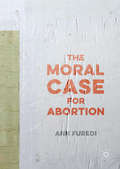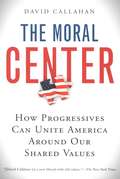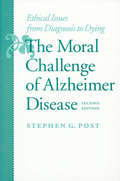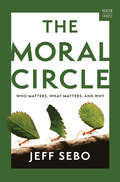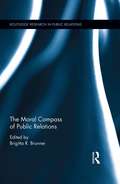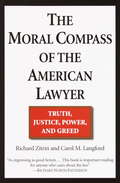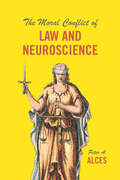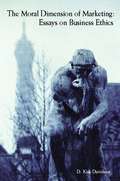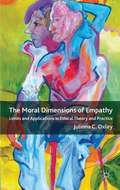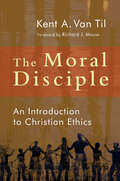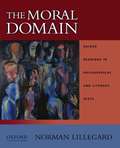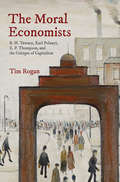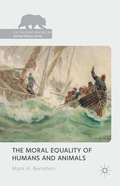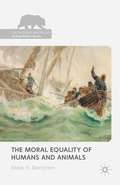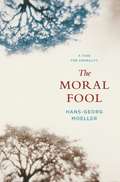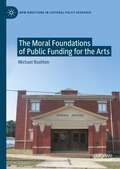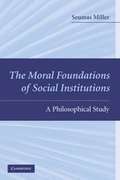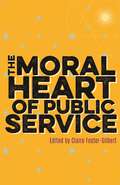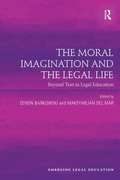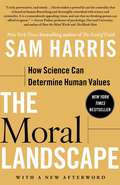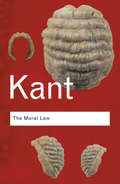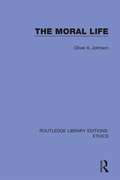- Table View
- List View
The Moral Case for Abortion
by Ann FurediThis thought-provoking book sets out the ethical arguments for a woman’s right to choose. Drawing on the traditions of sociological thinking and moral philosophy, it maintains that there is a strong moral case for recognizing autonomy in personal decision-making about reproductive intentions. More than this, it argues that to prevent a woman from making her own choice to continue or end her pregnancy is to undermine the essence of her humanity. The author, a provider of abortion services in the UK, asserts that true respect for human life and true regard for individual conscience demand that we respect a woman’s right to decide, and that support for a woman’s right to a termination has moral foundations and ethical integrity. This fresh perspective on abortion will interest both pro- and anti-choice individuals and organizations, along with academics in the fields of gender studies, philosophy, ethics and religion.
The Moral Case for Abortion: A Defence of Reproductive Choice
by Ann FurediThis revised and updated edition of the 2016 bestselling work sets out the moral arguments for a woman’s right to decide the future of her pregnancy. Drawing on traditions of philosophical and sociological thinking, it presents the case for recognizing autonomy in personal, private decision-making about reproductive intentions. Further, it argues that to prevent a woman making this decision according to her own values is to undermine the essence of her humanity. The author explores how true respect for human life and regard for individual conscience demands that we support a woman’s right to decide, and that support for her right to terminate her pregnancy has moral foundations and ethical integrity. This second edition features a foreword by US abortion provider and reproductive justice advocate Dr. Willie Parker, as well as additional chapters that consider the rights of doctors and nurses to withdraw from abortion provision on grounds of conscience. Furedi also surveys the rapidly changing landscape of the abortion debate, including the rights of women in the aftermath of Trump's presidency; debates, politics and religion in Northern Ireland and the Republic of Ireland; and the differing levels of provision across Europe.
The Moral Center: How Progressives Can Unite America Around Our Shared Values
by David CallahanA &“new liberal with old values&” argues nothing is the matter with Kansas—and that the Democratic party needs to lead America out of its moral crisis (The New York Times). In this insightful book, the author of The Cheating Culture addresses the anxieties that many Americans share, pointing out that the problems most people care about are not hot-button partisan issues like abortion and gay marriage, but rather deeper subjects that neither party is addressing—the selfishness that is careening out of control, the effect of our violent and consumerist culture on children, and our lack of a greater purpose. As Republicans veer into zealotry, liberals can find common ground with the moderate majority. But to achieve electoral victories, they need a powerful new vision. In The Moral Center, David Callahan articulates that vision—and offers an escape from the dead-end culture war. With insights garnered from in-depth research and interviews, he examines some of our most polarized conflicts and presents unexpected solutions that lay out a new road map to the American center. &“Brilliant, challenging, practical and hopeful.&” —E. J. Dionne Jr., author of Why Americans Hate Politics &“Callahan shows why progressives often seem not to have such a [moral] center, ceding values to the Right, and why they need to get one to win the political battle.&” —Benjamin R. Barber, author of Consumed and Jihad vs. McWorld &“Callahan wants . . . to create a new public morality that is concerned about both poverty and video game violence, both wages and rap lyrics. He wants to soften the jagged edges of the culture wars.&” —Michael Tomasky, The New York Review of Books
The Moral Challenge of Alzheimer Disease: Ethical Issues from Diagnosis to Dying (Gerontology)
by Stephen G. PostSociety today, writes Stephen Post, is "hypercognitive": it places inordinate emphasis on people's powers of rational thinking and memory. Thus, Alzheimer disease and other dementias, which over an extended period incrementally rob patients of exactly those functions, raise many dilemmas. How are we to view—and value—persons deprived of what some consider the most important human capacities?In the second edition of The Moral Challenge of Alzheimer Disease, Post updates his highly praised account of the major ethical issues relating to dementia care. With chapters organized to follow the progression from mild to severe and then terminal stages of dementia, Post discusses topics including the experience of dementia, family caregiving, genetic testing for Alzheimer disease, quality of life, and assisted suicide and euthanasia. New to this edition are sections dealing with end-of-life issues (especially artificial nutrition and hydration), the emerging cognitive-enhancing drugs, distributive justice, spirituality, and hospice, as well as a critique of rationalistic definitions of personhood. The last chapter is a new summary of practical solutions useful to family members and professionals.
The Moral Circle: Who Matters, What Matters, and Why (A Norton Short)
by Jeff SeboA philosopher calls for a revolution in ethics, suggesting we expand our “moral circle” to include insects, AI systems, and even microbes. Today, human exceptionalism is the norm. Despite occasional nods to animal welfare, we prioritize humanity, often neglecting the welfare of a vast number of beings. As a result, we use hundreds of billions of vertebrates and trillions of invertebrates every year for a variety of purposes, often unnecessarily. We also plan to use animals, AI systems, and other nonhumans at even higher levels in the future. Yet as the dominant species, humanity has a responsibility to ask: Which nonhumans matter, how much do they matter, and what do we owe them in a world reshaped by human activity and technology? In The Moral Circle, philosopher Jeff Sebo challenges us to include all potentially significant beings in our moral community, with transformative implications for our lives and societies This book explores provocative case studies such as lawsuits over captive elephants and debates over factory-farmed insects, and compels us to consider future ethical quandaries, such as whether to send microbes to new planets, and whether to create virtual worlds filled with digital minds. Taking an expansive view of human responsibility, Sebo argues that building a positive future requires the shedding of human exceptionalism and radically rethinking our place in the world.
The Moral Compass of Public Relations (Routledge Research in Public Relations)
by Brigitta R. BrunnerThe civic and moral responsibilities of public relations are hotly contested topics. While many researchers call for focusing on ethics in public relations, they concentrate on ethics in relation to how people do their jobs. In actuality, emphasis should move beyond professional codes of ethics to include general morality and citizenship. Currently, as the profession receives greater scrutiny, it is important to be aware of the value of public relations in the community. This book centers on four areas of public relations’ conscience in order to examine its role in morality and citizenship: civic professionalism, corporate social responsibility, ethics, and public communication. This approach will help to answer the question of what is public relations’ responsibility to the public good.
The Moral Compass of the American Lawyer
by Richard A. Zitrin Carol M. LangfordThese are perilous times for Americans who need access to the legal system. Too many lawyers blatantly abuse power and trust, engage in reckless ethical misconduct, grossly unjust billing practices, and dishonesty disguised as client protection. All this has undermined the credibility of lawyers and the authority of the legal system. In the court of public opinion, many lawyers these days are guiltier than the criminals or giant corporations they defend.Is the public right? In this eye-opening, incisive book, Richard Zitrin and Carol Langford, two practicing lawyers and distinguished law professors, shine a penetrating light on the question everyone is asking: Why do lawyers behave the way they do? All across the country, lawyers view certain behavior as "ethical" while average citizens judge that same conduct "immoral." Now, with expert analysis of actual cases ranging from murder to class action suits, Zitrin and Langford investigate lawyers' behavior and its impact on our legal system. The result is a stunningly clear-eyed exploration of law as it is practiced in America today--and a cogent, groundbreaking program for legal reform.From the Trade Paperback edition.
The Moral Conflict of Law and Neuroscience
by Peter A. AlcesLaw relies on a conception of human agency, the idea that humans are capable of making their own choices and are morally responsible for the consequences. But what if that is not the case? Over the past half century, the story of the law has been one of increased acuity concerning the human condition, especially the workings of the brain. The law already considers select cognitive realities in evaluating questions of agency and responsibility, such as age, sanity, and emotional distress. As new neuroscientific research comprehensively calls into question the very idea of free will, how should the law respond to this revised understanding? Peter A. Alces considers where and how the law currently fails to appreciate the neuroscientific revelation that humans may in key ways lack normative free will—and therefore moral responsibility. The most accessible setting in which to consider the potential impact of neuroscience is criminal law, as certain aspects of criminal law already reveal the naiveté of most normative reasoning, such as the inconsistent treatment of people with equally disadvantageous cognitive deficits, whether congenital or acquired. But tort and contract law also assume a flawed conception of human agency and responsibility. Alces reveals the internal contradictions of extant legal doctrine and concludes by considering what would be involved in constructing novel legal regimes based on emerging neuroscientific insights.
The Moral Dimension of Marketing: Essays on Business Ethics
by D. Kirk DavidsonThe essays are all based on real-life situations that students and professionals alike will recognize, and they are grouped under familiar marketing headings: targeting, products, pricing, promotion and advertising, distribution, privacy, and inappropriate marketing.
The Moral Dimensions of Empathy
by Julinna C. OxleyDoes empathy help us to be moral? The author argues that empathy is often instrumental to meeting the demands of morality as defined by various ethical theories. This multi-faceted work links psychological research on empathy with ethical theory and contemporary trends in moral education.
The Moral Disciple: An Introduction to Christian Ethics
by Kent A. Van TilThe ability to judge good from bad, right from wrong, is a uniquely human characteristic. However, given the complexity of life, it is often difficult to discern which choice to make, where our responsibilities lie, or what the consequences of an action (or of a nonaction) will be. In The Moral Disciple Kent Van Til surveys the skills and dispositions that we need to address moral issues responsibly. This basic introduction to Christian ethics — the systematic evaluation of morality — highlights the centrality of Christ and the Christian faith in moral formation, and it offers an ethical framework to guide Christians as they engage a host of moral dilemmas, including those surrounding wealth, sexuality, and the end of life. Using easy-to-read prose and defining terms carefully, Van Til provides an accessible introduction to this crucial and practical subject.
The Moral Domain: Guided Readings in Philosophical and Literary Texts
by Norman Lillegard<p>This engaging, interactive and pedagogical introduction to ethics combines the best features of a textbook and an anthology. The Moral Domain: Guided Readings in Philosophical and Literary Texts contains numerous readings from key philosophical writings in ethics along with captivating literary selections that bring the ethical issues to life. Offering extensive excerpts from major figures in the history of Western ethics--Aquinas, Aristotle, Hobbes, Hume, Kant, Mill and Plato--the book also integrates work from non-Western perspectives, including selections from the Bhagavad Gita, Confucian views and Hsun-Tzu. It also represents women's voices with readings by Julia Annas, Sarah Broadie, Carol Gilligan, Martha Nussbaum and others. Literary selections--including work from the Bible, Camus, Dostoevsky, Golding, Sophocles, Tolstoy, Twain and Wharton--enable students to grasp deep ethical concepts at an intuitive level. <p>The Moral Domain features a unique built-in study guide that helps students to better comprehend and interact with the material. It introduces each selection with orienting questions and then intersperses explanations, commentary and study questions (designed to test comprehension and provoke reflection) throughout the readings. Each chapter includes a "Further Discussion and Applications" section that demonstrates how ethical theory affects such contemporary moral debates and problems as abortion, euthanasia, feminism, hunger, warfare and more. An exemplary text for introduction to ethics and moral philosophy courses, The Moral Domain provides a comprehensive and accessible introduction to all facets of ethics; its foundations, history, debates and current real-life controversies.</p>
The Moral Economists: R. H. Tawney, Karl Polanyi, E. P. Thompson, and the Critique of Capitalism
by Tim RoganA fresh look at how three important twentieth-century British thinkers viewed capitalism through a moral rather than material lensWhat’s wrong with capitalism? Answers to that question today focus on material inequality. Led by economists and conducted in utilitarian terms, the critique of capitalism in the twenty-first century is primarily concerned with disparities in income and wealth. It was not always so. The Moral Economists reconstructs another critical tradition, developed across the twentieth century in Britain, in which material deprivation was less important than moral or spiritual desolation.Tim Rogan focuses on three of the twentieth century’s most influential critics of capitalism—R. H. Tawney, Karl Polanyi, and E. P. Thompson. Making arguments about the relationships between economics and ethics in modernity, their works commanded wide readerships, shaped research agendas, and influenced public opinion. Rejecting the social philosophy of laissez-faire but fearing authoritarianism, these writers sought out forms of social solidarity closer than individualism admitted but freer than collectivism allowed. They discovered such solidarities while teaching economics, history, and literature to workers in the north of England and elsewhere. They wrote histories of capitalism to make these solidarities articulate. They used makeshift languages of “tradition” and “custom” to describe them until Thompson patented the idea of the “moral economy.” Their program began as a way of theorizing everything economics left out, but in challenging utilitarian orthodoxy in economics from the outside, they anticipated the work of later innovators inside economics.Examining the moral cornerstones of a twentieth-century critique of capitalism, The Moral Economists explains why this critique fell into disuse, and how it might be reformulated for the twenty-first century.
The Moral Equality of Humans and Animals (The Palgrave Macmillan Animal Ethics Series)
by Mark BernsteinThe Moral Equality of Humans and Animals.
The Moral Equality of Humans and Animals (The Palgrave Macmillan Animal Ethics Series)
by Mark H BernsteinReceived opinion has it that humans are morally superior to non-human animals; human interests matter more than the like interests of animals and the value of human lives is alleged to be greater than the value of nonhuman animal lives. Since this belief causes mayhem and murder, its de-mythologizing requires urgent attention.
The Moral Fool: A Case for Amorality
by Hans-Georg MoellerJustice, equality, and righteousness-these are some of our greatest moral convictions. Yet in times of social conflict, morals can become rigid, making religious war, ethnic cleansing, and political purges possible. Morality, therefore, can be viewed as pathology-a rhetorical, psychological, and social tool that is used and abused as a weapon. An expert on Eastern philosophies and social systems theory, Hans-Georg Moeller questions the perceived goodness of morality and those who claim morality is inherently positive. Critiquing the ethical "fanaticism" of Western moralists, such as Immanuel Kant, Lawrence Kohlberg, John Rawls, and the utilitarians, Moeller points to the absurd fundamentalisms and impracticable prescriptions arising from definitions of good. Instead he advances a theory of "moral foolishness," or moral asceticism, extracted from the "amoral" philosophers of East Asia and such thinkers as Ludwig Wittgenstein and Niklas Luhmann. The moral fool doesn't understand why ethics are necessarily good, and he isn't convinced that the moral perspective is always positive. In this way he is like most people, and Moeller defends this foolishness against ethical pathologies that support the death penalty, just wars, and even Jerry Springer's crude moral theater. Comparing and contrasting the religious philosophies of Christianity, Daoism, and Zen Buddhism, Moeller presents a persuasive argument in favor of amorality.
The Moral Foundations of Public Funding for the Arts (New Directions in Cultural Policy Research)
by Michael RushtonThis book provides a detailed account, and critique, of diverse approaches to the arts funding question, with a focus on the arm’s length arts councils that are the norm in the Anglo-American world. It builds on economic methods, the liberal-egalitarian framework of John Rawls, the communitarian opposition to the liberal framework, the capabilities approach to equality, and the cultural conservatism of Roger Scruton and others. In each case, the book considers the very practical aspect of public funding of the arts, namely, what are the implications for what ought to receive priority, and what parts of the cultural world are best left to their own, private sector, devices. It is not a work of “arts advocacy”. Rather, the book challenges assumptions, and sparks critical debate in the field.
The Moral Foundations of Social Institutions
by Seumas MillerIn this book, Seumas Miller examines the moral foundations of contemporary social institutions. Offering an original general theory of social institutions, he posits that all social institutions exist to realize various collective ends, indeed, to produce collective goods. He analyses key concepts such as collective responsibility and institutional corruption. Miller also provides distinctive special theories of particular institutions, including governments, welfare agencies, universities, police organizations, business corporations, and communications and information technology entities. These theories are philosophical and, thus, foundational and synoptic in character. They are normative accounts of a sampling of contemporary social institutions, not descriptive accounts of all social institutions, both past and present. Miller also addresses various ethical challenges confronting contemporary institutional designers and policymakers, including the renovation of the international financial system, the 'dumbing down' of the media, the challenge of world poverty, and human rights infringements by security agencies combating global terrorism.
The Moral Heart of Public Service
by William Hague Rowan Williams John Hall Andrew Tremlett Claire Foster-Gilbert Mary Mcaleese Peter Hennessy Stephen Lamport The Dean Westminster Vernon WhiteNow more than ever, public servants must consider and reassess how to keep moral courage in public life alive. With ethical expectations and needs changing and government policies under increasing moral scrutiny, Claire Foster-Gilbert of Westminster Abbey Institute gathers a series of essays and lectures by herself and others, exploring the meaning of 'moral code' in today's public service, and how it can be rekindled in practice. Timely and timeless, the book is founded on traditional values of honesty, moral rigour and neighbourliness, and discusses how to champion stability, peace, community and virtue in contemporary public life. The authors, including eminent figures such as the former President of Ireland Mary McAleese, historian Peter Hennessy, former First Secretary of State William Hague and former Archbishop of Canterbury Rowan Williams, explain how realistic compromises can be balanced with clear goal-setting for ideal results. Forward-thinking and authoritative, this book will be a precious resource to anyone seeking to boost the circulation of integrity throughout all aspects of public life.
The Moral Imagination and the Legal Life: Beyond Text in Legal Education (Emerging Legal Education)
by Maksymilian Del Mar Zenon BańkowskiWhat role can resources that go beyond text play in the development of moral education in law schools and law firms? How can these resources - especially those from the visual and performing arts - nourish the imagination needed to confront the ethical complexities of particular situations? This book asks and answers these questions, thereby introducing radically new resources for law schools and law firms committed to fighting against the moral complacency that can all too often creep into the life of the law. The chapters in this volume build on the companion volume, The Arts and the Legal Academy, also published by Ashgate, which focuses on the role of non-textual resources in legal education generally. Concentrating in particular on the moral dimension of legal education, the contributors to this volume include a wide range of theorists and leading legal educators from the UK and the US.
The Moral Imagination of Patricia Werhane: A Festschrift (Issues in Business Ethics #47)
by R. Edward Freeman Andrew C. Wicks Sergiy DmytriyevThis book celebrates the work of Patricia Werhane, an iconic figure in business ethics. This festschrift is a collection of articles that build on Werhane’s contributions to business ethics in such areas as Employee Rights, the Legacy of Adam Smith, Moral Imagination, Women in Business, the development of the field of business ethics, and her contributions to such fields as Health Care, Education, Teaching, and Philosophy.All papers are new contributions to the management literature written by well-known business ethicists, such as Norman Bowie, Richard De George, Ronald Duska, Edwin Hartman, Michael Hoffman, Mollie Painter-Morland, Mark Schwartz, Andrew Wicks, and others. The volume is comprised of articles that reflect on Werhane’s work as well as build on it as a way to advance further research. At the end of the festschrift, Pat Werhane provides responses to each chapter. The first chapter of the book also includes the overview of Patricia Werhane’s work and her academic career.The book is written to appeal to management scholars and graduate students interested in the areas of Business Ethics, Modern Capitalism, and Human Rights. Patricia Werhane is one of the most distinguished figures in the field of business ethics. She was a founder of the field, she is one of its leading scholars, and she has had a profound impact on the world of business practice. Among her many accomplishments, Pat is known for her original work on moral imagination, she is an acclaimed authority on employee rights in the workplace, and she is one of the leading scholars on Adam Smith. Having been active in Academia for over 50 years, Werhane is a prolific author of over a hundred articles and book chapters, and the author or editor of twenty-seven books, including Adam Smith and his Legacy for Modern Capitalism, Moral Imagination and Management Decision-Making, and co-authored books Organization Ethics in Health Care, Alleviating Poverty Through Profitable Partnerships, Obstacles to Ethical Decision-Making, Corporate Responsibility: The American Experience, and Research Approaches to Business Ethics and Corporate Responsibility.
The Moral Implications of Human and Animal Vulnerability
by Angela K. MartinIn this open access book, Angela K. Martin thoroughly addresses what human and animal vulnerability are, how and why they matter from a moral point of view, and how they compare to each other. By first defining universal and situational human vulnerability, Martin lays the groundwork for investigating whether sentient nonhuman animals can also qualify as vulnerable beings. She then takes a closer look at three different contexts of animal vulnerability: animals used as a source of food, animals used in research, and the fate of wild animals.
The Moral Landscape: How Science Can Determine Human Values
by Sam HarrisNew York Times bestselling author Sam Harris&’s first book, The End of Faith, ignited a worldwide debate about the validity of religion. In the aftermath, Harris discovered that most people—from religious fundamentalists to non-believing scientists—agree on one point: science has nothing to say on the subject of human values. Indeed, our failure to address questions of meaning and morality through science has now become the primary justification for religious faith.In this highly controversial book, Sam Harris seeks to link morality to the rest of human knowledge. Defining morality in terms of human and animal well-being, Harris argues that science can do more than tell how we are; it can, in principle, tell us how we ought to be. In his view, moral relativism is simply false—and comes at an increasing cost to humanity. And the intrusions of religion into the sphere of human values can be finally repelled: for just as there is no such thing as Christian physics or Muslim algebra, there can be no Christian or Muslim morality. Using his expertise in philosophy and neuroscience, along with his experience on the front lines of our “culture wars,” Harris delivers a game-changing book about the future of science and about the real basis of human cooperation.
The Moral Law: Groundwork of the Metaphysics of Morals
by Immanuel KantFew books have had as great an impact on intellectual history as Kant's The Moral Law. In its short compass one of the greatest minds in the history of philosophy attempts to identify the fundamental principle 'morality' that governs human action. Supported by a clear introduction and detailed summary of the argument, this is not only an essential text for students but also the perfect introduction for any reader who wishes to encounter at first hand the mind of one of the finest and most influential thinkers of all time.
The Moral Life
by Oliver JohnsonOriginally published in 1969, this book challenges the view among many 20th Century philosophers that no cogent arguments could be found capable of providing support for the normative pronouncements of practical morality. The book asserts that this conclusion is mistaken and the result of basic deficiencies endemic in the logical structure of traditional ethics. The volume develops an argument whose logical structure is quite different from the ways of reasoning that have dominated the history of Western ethics and which allows answers to such primary questions of practical morality such as ‘How ought we as moral beings to act?’
